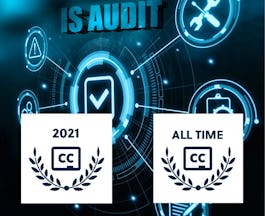Filter by
The language used throughout the course, in both instruction and assessments.
Choose the Management Information Systems Course That Aligns Best With Your Educational Goals

University of Minnesota
Skills you'll gain: Business Process Management, Leadership and Management, Strategy and Operations, Business Transformation, Project Management, Business Analysis, Data Management, Business Development, Decision Making, Planning, Process Analysis, Software As A Service, Organizational Development, Risk Management, Software Testing, Agile Software Development, Change Management, Cloud Computing, Operations Management, Other Mobile Programming Languages, Systems Design, Customer Relationship Management, Design and Product, Security Engineering, Software-Defined Networking, Supply Chain and Logistics, BlockChain, Cryptography, Cyberattacks, Network Security

Salesforce
Skills you'll gain: Sales, Customer Relationship Management, Salesforce, Sales Systems, Account Management, Business Process Management, Customer Success, Leadership and Management, Marketing, Operations Management, Strategy, Strategy and Operations, B2B Sales, Databases, Business Analysis, Data Visualization, Data Visualization Software

Skills you'll gain: Cloud Computing, Leadership and Management
 Status: Free
Status: FreeThe Hong Kong University of Science and Technology
Skills you'll gain: Security Engineering, Strategy and Operations, Change Management, Leadership and Management, Risk Management

Microsoft
Skills you'll gain: Cloud Computing, Computer Architecture, Data Management, Leadership and Management, Microsoft Azure, Network Security, Operating Systems

Skills you'll gain: Data Analysis, Data Management, Data Visualization, Databases, Python Programming, SQL, Big Data, Data Mining, Data Science, NoSQL, Microsoft Excel

Skills you'll gain: Software Engineering, Agile Software Development, Scrum (Software Development), Business Analysis, Communication, Leadership and Management, Project Management, Risk Management

Coursera Project Network
Skills you'll gain: Customer Relationship Management, Marketing, Data Management, Leadership and Management
 Status: Free
Status: FreeYale University

Northeastern University
Skills you'll gain: Data Management
 Status: Free
Status: FreeUNSW Sydney (The University of New South Wales)
Skills you'll gain: Systems Design, Leadership and Management

University of Illinois at Urbana-Champaign
Skills you'll gain: Data Analysis, Business Analysis, R Programming, Data Visualization, Exploratory Data Analysis, Data Analysis Software, Machine Learning, Statistical Machine Learning, Data Management, Interactive Data Visualization, Statistical Programming, Algorithms, Data Model, Extract, Transform, Load, Accounting, Communication, Customer Analysis, Data Mining, Data Visualization Software, Machine Learning Algorithms, Plot (Graphics), Probability & Statistics, Statistical Analysis, Audit, Business Communication, Market Research, Marketing, Natural Language Processing, Regression, Visual Design, Visualization (Computer Graphics), Accounting Software, General Statistics, Market Analysis, Storytelling, Computer Programming
Searches related to management information systems
In summary, here are 10 of our most popular management information systems courses
- Information Systems: University of Minnesota
- Salesforce Sales Operations: Salesforce
- System Administration and IT Infrastructure Services: Google
- Information Systems Auditing, Controls and Assurance: The Hong Kong University of Science and Technology
- Microsoft Cybersecurity Analyst: Microsoft
- Introduction to Data Analytics: IBM
- IBM Project Manager: IBM
- Introduction to CRM with HubSpot: Coursera Project Network
- Managing Emotions in Times of Uncertainty & Stress: Yale University
- Healthcare Data Management and Information Systems: Northeastern University










